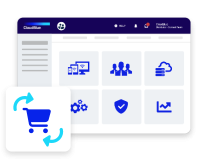A vertical marketplace is a specialized online platform that focuses on a single industry or niche, offering products, services, or software tailored specifically to that sector.
Unlike general marketplaces that cater to a broad range of industries, vertical marketplaces concentrate on a single category, providing a focused experience for buyers and sellers.
For example, a vertical marketplace might cater exclusively to healthcare, construction, or agriculture, facilitating transactions and services that are unique to those industries.
In the SaaS space, a vertical marketplace may offer software solutions specifically designed for enterprise or B2B needs within one sector, helping companies streamline purchases and improve industry-specific processes.
Vertical vs. Horizontal Marketplaces
A vertical marketplace is often compared to a horizontal marketplace, which serves a wide range of industries and products.
Horizontal marketplaces like Amazon or Alibaba appeal to a broad customer base with a diverse range of offerings, while vertical marketplaces cater to a narrow customer segment with highly specialized needs.
The primary benefit of a vertical marketplace is its ability to provide tailored solutions, which can lead to better functionality, compliance, and support for industry-specific requirements. For instance, a healthcare-focused vertical marketplace may offer products and software that comply with regulatory standards in that field, whereas a horizontal marketplace may not offer the same level of specificity.
For B2B and enterprise buyers, the specialized nature of a vertical marketplace can simplify procurement by focusing on relevant products and suppliers.
Benefits of Vertical Marketplaces in SaaS
Vertical marketplaces in SaaS are especially beneficial for businesses looking to adopt industry-specific software.
They offer curated SaaS solutions, often with features that address the unique needs of a particular sector. By focusing on a niche, these platforms enable vendors to connect with buyers looking for solutions to specific problems, creating a more streamlined purchasing journey.
This specialized approach can lead to greater efficiency, as businesses don’t have to sift through irrelevant software options, and providers on these platforms tend to be more attuned to the demands of the target industry.
Additionally, vertical marketplaces often facilitate networking, collaboration, and knowledge-sharing within an industry, creating value beyond just transactions.













